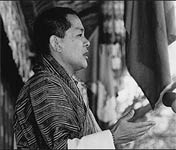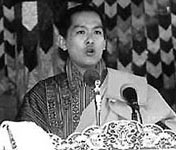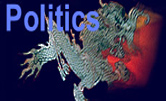|
Bhutan's
new Constitution
|
 |
Bhutan Politics |
|
 |
Bhutan Information |
|
|
|
|
First
draft of the Constitution submitted to His Majesty
|

|
December
2002
| His
Majesty the King said ... |
 |
| ...
it was natural that a number of institutions, legislation, and systems
would need to be in place for the Constitution to be effective. For example,
with more than 3,000 representatives required to be elected to the dzongkhag
yarkye tshogdues and geog yarkye tshogchungs, it would provide a good opportunity
for an election commission to gain experience in the electoral process.
The recent election of the gups had proved that it was necessary to update
the national census records to avoid unnecessary problems for eligible
voters. |
| ...
that the Constitution must provide the legislative framework for good governance
and democratic rule. It was important to solve the security problem and
ensure stability in the kingdom before introducing major political changes
with the enactment of the Constitution. It was, therefore, critical that
the country had a strong and stable government. |
| ...
that he understood the concerns of the people who had seen the negative
impact of democratic rule elsewhere. People believed that the political
intrigues of democracy at different levels allowed the growth of corruption
and many other problems. Such patterns were visible everywhere. |
| ...
that he had also heard the skepticism of foreign observers who believed
that Bhutan and the Bhutanese people lacked the political experience and
maturity to support democratic rule. That was also understandable because
foreigners were not aware of the continuous evolution that had been taking
place within the Bhutanese system. |
| ...
that the introduction of the Constitution of Bhutan was not an ad hoc or
sudden move. It was part of a carefully planned process of political reformation.
The rest of the world may not be aware of it but His Majesty reminded the
committee members that today's generation of Bhutanese had been through
27 years of political evolution at the central, dzongkhag, and geog levels. |
|
top
| His
Majesty the King's expressions |
| His
Majesty informed the committee members that he was aware of the concerns
and misgivings of the Bhutanese people over the negative impact of introducing
such major political reforms when the nation was enjoying an era of peace
and prosperity. The people were expressing their doubts about the wisdom
of introducing a Constitution and changing a stable time-tested system. |
| His
Majesty had initiated the decentralisation process with the establishment
of the dzongkhag yarkye tshodue in 1981 and the geog yarkye tshogchung
in 1991. In 1998 His Majesty had devolved all executive power to the lhengye
zhungtsho headed by the chairman who was the prime minister. Most recently,
with the enactment of the DYT and GYT chathrims, 3,000 local government
leaders were elected across the country with considerable administrative
and financial authority devolved to the DYT and GYT. It was natural that
political changes would be accompanied by numerous problems, His Majesty
said. But it was important to go ahead and overcome the challenges. "The
Constitution of our country must fulfill the aspirations of our people
and it must be relevant and beneficial for the best interests of the nation,"
His Majesty said. "It should not merely be transplanted from elsewhere."
Responding to concerns about outside influences, His Majesty advised that
it was important to study other constitutions, to seek international expertise,
and adapt what was relevant for Bhutan. It was most important for Bhutan
to learn from the experiences of other countries to ensure that the best
possible Constitution was framed to serve the interests of the people and
the country. |
| His
Majesty the King advised the committee members that it was important to
establish clear rules and regulations governing the King and the royal
family. The Constitution must not be drawn up to benefit the King. It was
more important to ensure that the King would best be able to serve the
Constitution. |
|


|
| His
Majesty expressed his confidence that, after three decades of political
experience, the Bhutanese people had the political maturity and sense of
responsibility to be able to look ahead, to share the burden of state,
be capable of good governance, and to safeguard the sovereignty of the
country. It was vital that the Bhutanese people remained united in their
thoughts and actions and in their dedication and commitment to the nation.
"I have been saying, for 30 years, that the destiny of the nation lies
in the hands of the people," His Majesty said. "I have always made it clear
that the people are more important than the King. We cannot leave the future
of the country in the hands of one person. These are not mere words. The
Constitution will be the fulfillment of our country's destiny being placed
in the hands of our people." |
| His
Majesty the King commended the members of the drafting committee for their
efforts in completing, within one year, the first draft of the Constitution.
His Majesty expressed his deep appreciation and tashi delek to the chief
justice, the speaker of the National Assembly, representatives of the clergy,
the royal advisory council, the people's representatives of the 20 dzongkhags,
and the representatives of the thrimkhang and government for the successful
completion of the first draft Constitution of the kingdom of Bhutan. |
| His
Majesty expressed his confidence that, as Bhutan faced the challenges of
the future, the Bhutanese people had the integrity, the perception, and
the capability to carry out the important responsibility of shaping the
destiny of the nation. |
| This
article was contributed by Kuensel, Bhutan's National Newspaper, 2002 |
 |
| Links |
 |
 |
 |
External
links |
|





